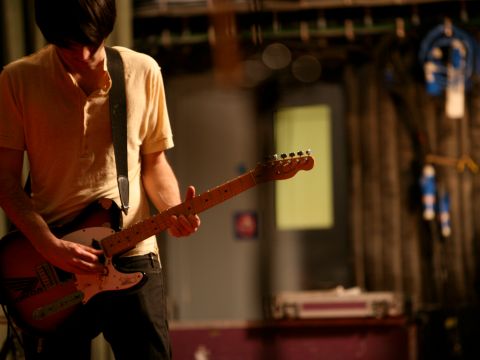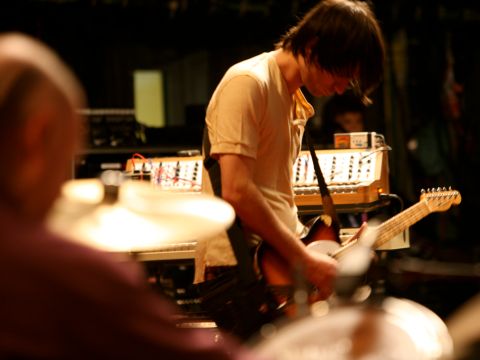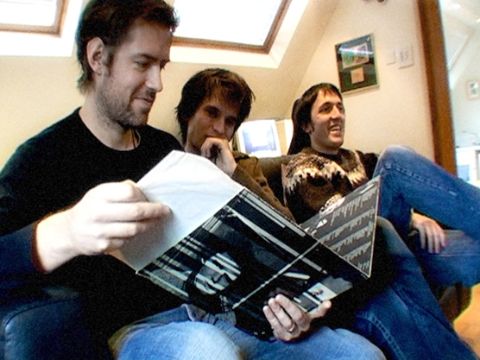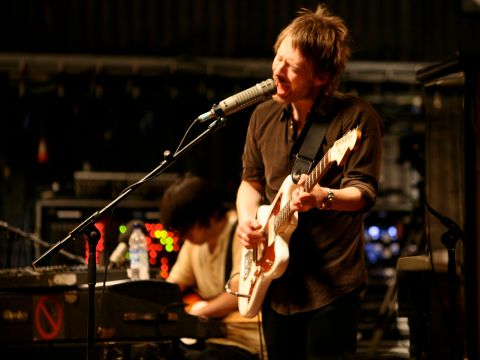
Jonathan Richard Guy "Jonny" Greenwood (born 5 November 1971) is an English musician and composer best known as a member of the rock band Radiohead. Beyond his primary roles as Radiohead's lead guitarist and keyboardist, Greenwood is a multi-instrumentalist and also plays viola, harmonica, glockenspiel, ondes Martenot, banjo and drums, and works with computer-generated sounds and sampling; he is also a computer programmer and writes music software used by Radiohead. Noted for his aggressive playing style, Greenwood is consistently named as one of the greatest guitarists of all time.
Greenwood composed the soundtracks for the films Bodysong (2003), There Will Be Blood (2007), Norwegian Wood (2010), We Need To Talk About Kevin (2011), The Master (2012) and Inherent Vice (2014), and serves as composer-in-residence for the BBC Concert Orchestra. He is the younger brother of Radiohead bassist Colin Greenwood.

Career
Greenwood is the only member of Radiohead to have been classically trained on any instrument, and the only band member without a university degree; he was three weeks into a degree in music and psychology at Oxford Brookes University when Radiohead, then known as On a Friday, signed a recording contract with EMI in 1991, and left soon after. Greenwood stated that hearing Krzysztof Penderecki during that time had a significant influence on his perception of modern classical music.Greenwood's influence on Radiohead's recording and writing can be heard in many songs, as he usually takes the traditional lead guitarist role. In the 1990s, Greenwood wore an arm brace due to a repetitive strain injury attributed to his aggressive playing, saying "it's like taping up your fingers before a boxing match."
Greenwood is often credited as the second major influence on songwriting in Radiohead, next to Thom Yorke. He wrote the music for the closing track of OK Computer, ("The Tourist"), and the intro, chorus and outro sections of the song "Subterranean Homesick Alien" from the OK Computer album, as well as the final section of "Paranoid Android". According to Yorke, the track "Just" from The Bends was "a competition by me and Jonny to get as many chords as possible into a song". An example of Greenwood's versatility is his use of the ondes Martenot, which is featured on songs such as "The National Anthem" and "How to Disappear Completely" from the album Kid A, and "Pyramid Song" from the album Amnesiac. The song "Where I End and You Begin" from Hail to the Thief, which also features the instrument, was dedicated to the memory of Jeanne Loriod, a pioneer of the Marenot. Greenwood is interviewed by Suzanne Binet-Audet about his affection for the instrument and briefly plays it in the 2012 documentary film Wavemakers.
Greenwood and Yorke also collaborated on the song "Arpeggi" which is a piece in a classical style centred around arpeggios for voice, ondes, and orchestra. It was performed with the London Sinfonietta and Arab Orchestra of Nazareth at the Ether Festival in March 2005; the song would later be adapted for the full band to play in 2006, rearranged for guitar. A studio version (closer to the full band version than the orchestral version) appeared on the album In Rainbows as "Weird Fishes/Arpeggi".
Greenwood is a computer programmer and builds software used in Radiohead's music. He became interested in programming when he was young, "playing around first with BASIC, then these primitive hex assemblers. Just simple bits of machine code – the closer I got to the bare bones of the computer, the more exciting I found it." At the suggestion of Radiohead producer Nigel Godrich, Greenwood began using the music programing language Max, and said: "I got to reconnect properly with computers ... I didn't have to use someone else's idea of what a delay, or a reverb, or a sequencer should do, or should sound like – I could start from the ground, and think in terms of sound and maths. It was like coming off the rails." Greenwood wrote the software Radiohead used to sample their playing for their eighth album, The King of Limbs (2011).

Solo and orchestral work
In 2003, Greenwood released his first solo work, Bodysong, the soundtrack for the movie of the same title directed by Simon Pummell and produced by Janine Marmot, featuring his brother and Radiohead bandmate Colin on bass. In March 2004, Greenwood's first work for orchestra, smear, received its premiere, performed by the London Sinfonietta. In May he was appointed composer-in-residence to the BBC Concert Orchestra, for whom he wrote "Popcorn Superhet Receiver" (2005), which won the Radio 3 Listeners' Award at the 2006 BBC British Composer Awards. The piece was inspired by radio static and the elaborate, dissonant tone clusters of Krzysztof Penderecki's Threnody to the Victims of Hiroshima (1960). As part of his prize Greenwood received £10,000 from the PRS Foundation towards a commission for a new orchestral work. This would become Doghouse, finished in 2010.A fan of dub reggae, Greenwood released a compilation in collaboration with Trojan Records, entitled Jonny Greenwood Is the Controller in March 2007. This is the latest in Trojan's Artist Choice Jukebox series, to which DJ Spooky and Don Letts have already contributed. Trojan Records provided Greenwood with its extensive catalogue of songs, of which he chose 17. The title is a play on the first track on the collection, entitled "Dread Are the Controller", by Linval Thompson. The album contains tracks by artists such as Derrick Harriott, Gregory Isaacs, The Heptones and many more.
Greenwood composed the score for the 2007 film, There Will Be Blood, from director Paul Thomas Anderson. The soundtrack contains excerpts from "Popcorn Superhet Receiver". His work as the composer for this film was highly acclaimed by reviewers and earned him an award at the Critics' Choice Awards. On 21 January 2008, however, the score was declared ineligible for an Academy Award nomination under a rule that prohibited "scores diluted by the use of tracked themes or other pre-existing music." On 4 February 2008, it was announced that Greenwood had won the trophy for Best Film Score in the Evening Standard British Film Awards for 2007. In its 2009 end-of-decade round-up Rolling Stone magazine named the film the best of the decade and cited Greenwood's score as a major element in its success, "redefining what is possible in film scores".
In 2008, Greenwood wrote the title music for Adam Buxton's pilot sketch show meeBOX, and collaborated with Israeli rock musician Dudu Tasa on Tasa's Hebrew-language single "What a Day".
In February 2010, Greenwood debuted a composition entitled "Doghouse" at the BBC's Maida Vale Studios. In an interview following the performance, Greenwood and conductor Robert Ziegler revealed that the composition would be extrapolated into a score for the upcoming film Norwegian Wood directed by Anh Hung Tran, based on the best-selling novel of the same name by Haruki Murakami. Greenwood described the writing of the piece to the BBC, "I wrote this piece mostly in hotels and dressing rooms while touring with Radiohead. This was more practical than glamorous – lots of time sitting around indoors, lots of instruments about – and aside from picking up a few geographical working titles, I can't think that it had any effect where, on tour, it was written." The premiere of the entire score took place on 19 March 2010.
In 2011, Greenwood composed the score for the film adaptation of Lionel Shriver's novel We Need to Talk About Kevin. In 2012, he composed the score for Paul Thomas Anderson's film The Master.
On 13 March 2012, Greenwood and Krzysztof Penderecki released an album together on the Nonesuch label. It includes Greenwood's "Popcorn Superhet Receiver" and a new string orchestra work, "48 Responses to Polymorphia" (a homage to Penderecki's "Polymorphia" of 1961).
Water was commissioned by the Australian Chamber Orchestra, and is premiered by them on their European, Australian, and US tours in 2014/15. In an interview, Greenwood said: "With Radiohead, it's about arranging and recording songs as well as we can, and every time you hear them back it's gonna be the same, and it's the best you can get it. With orchestral music it's different. You can't pin it down, it's too strange to pin down. You can't commit it to coming out of two speakers and that's all it is. It's a bigger, stranger thing than that."

Musical influences
Greenwood is influenced by jazz and classical music; his favourites include Lee Morgan and Miles Davis. He is a major fan of the Mo' Wax label (onetime home of Blackalicious, DJ Krush, DJ Shadow and Dr. Octagon). Along with other Radiohead band members, he loves singer Scott Walker, Krautrock band Can and Polish composer Krzysztof Penderecki. Greenwood has stated that his all time favourite piece of music is Messiaen's Turangalila Symphony, a gigantic piece for orchestra that features an ondes Martenot, an instrument he discovered as a teenager through the symphony. According to one of his entries on Radiohead's blog 'Dead Air Space', Greenwood has become a dub reggae aficionado, listening as of late 2005 to little else.
Legacy
Greenwood has inspired many with his guitar playing and style. He is also known for his aggressive guitar playing style. Guitarists such as Russell Lissack of the English rock band Bloc Party and many others cite Greenwood as an influence. Greenwood was also ranked number 48 in Rolling Stone magazine's "100 Greatest Guitarists of All Time". When Rolling Stone Magazine updated their list in November 2011, Greenwood's rank had remained at 48.Personal life
In 1995 he married Israeli-born Sharona Katan, a visual artist whose work (credited as Shin Katan) appears on the covers of the Bodysong soundtrack as well as the There Will Be Blood soundtrack. Their first son, Tamir, was born in 2002 and the 2003 Radiohead album Hail to the Thief was dedicated to him. They also have a daughter named Omri, born in 2005, and a second son, named Zohar, who was born in February 2008. He is red-green colorblind.Interests
He listed his favourite video games on the band's website in 2010, cherishing Ico and spanning from 1984's Elite to 2010's Red Dead Redemption.

Electric guitars
Fender Telecaster Plus, with a custom cut-off switch and special rewirings made by Greenwood and Plank (Radiohead's guitar technician). It has a sticker of a manga character, Kozue Ayahara of Attack No. 1, on its scratch-board. This guitar is equipped with its original Lace Sensor pick-ups. Jonny has had three of Telecaster Plus guitars throughout his career, the first two of which were stolen in late 1995. His current Telecaster Plus was purchased after that theft.Fender Telecaster Standard converted into a Plus which also has a custom cut-off switch and Lace Sensor pick-ups
1975 Fender Starcaster, with Fender Wide Range pick-ups, can be heard predominantly on Kid A and Amnesiac, it is used for most Kid A and Amnesiac he plays guitar on live, and a few songs from OK Computer (Greenwood uses a string bow on the guitar in live versions of Pyramid Song).
A Gretsch G6119-1962HT Tennessee Rose HT. Gibson Les Paul Standard.
Gibson ES-335 (borrowed from fellow bandmember Ed O'Brien during the acoustic tour in 2003)
Rickenbacker 360 (used for The Daily Mail)
As of November 2008 Greenwood uses Dean Markley Signature Series 10–46 strings.
Acoustic guitars
Martin D-35
Taylor Big Baby (played by both Jonny Greenwood and Thom Yorke in pictures from Dead Air Space)
Amplifiers
Vox AC30 (tube amp, used for clean tones and with his Boss overdrive pedal for distorted tones)
Fender Eighty-Five (solid-state amp, used with his Marshall Shredmaster for distorted tones)
Early on in Greenwood's career, he used a Fender Twin Reverb for clean tones. Greenwood's Fender Eighty-Five has frequently been misidentified as a Fender Deluxe 85. It has never been confirmed that he has toured, or recorded, with a Deluxe 85.
In 2012, Greenwood used a Roland CUBE-30x.
Effects (guitar)
Electro-Harmonix Small Stone
Demeter 'The Tremulator' (early prototype of the Demeter TRM-1 Tremulator)
DOD 440 Envelope Filter (modified to include a LED)
DigiTech Whammy IV (replaced his old DigiTech WH-1 Whammy)
BOSS OD-3 OverDrive (replaced his old BOSS SD-1 SUPER OverDrive)
BOSS RE-20 Space Echo (replaced his old Roland RE-201 Space Echo)
BOSS RV-3 Digital Reverb/Delay
Akai Headrush E1 and E2
BOSS LS-2 Line Selector (A/B mode) (x4) (One for bringing in the Kaoss Pad into his setup and one for running his guitar through his Mac.)
Marshall ShredMaster (leads to Fender Eighty-Five)
Ernie Ball VP JR.
BOSS FV-300H, FV300L or FV-500L
BOSS TU-12H Chromatic Tuner (from 'tuner out' on FV-300H)
Roland FC-200 MIDI Foot Controller
Mutronics Mutator (used in the studio)
Voodoo Lab Pedal Power 2 Plus (one on each board)
Guitar rig & signal flow
A detailed gear diagram of Jonny Greenwood's 1997 Radiohead "OK Computer" Tour guitar rig is well-documented.
Keyboards
Analogue Systems RS8000 Integrator
Analogue Systems RS8500X
Analogue Systems French Connection
Ondes Martenot
Sequential Circuits Prophet-5
Korg Prophecy
Hammond XB2 Digital Organ
Moog Rogue
Mellotron M400
Rhodes Suitcase Piano Mark I 73
Fatar Keys CMS-161
Roland PC-200
Upright Piano
Celeste
Effects (keyboard)
BOSS RV-3 Digital Reverb/Delay
Electro-Harmonix Small Stone
BOSS FV-300L
BOSS LS-2 Line Selector
Akai Headrush E1 or E2
Demeter 'The Tremulator'
Roland RE-201 Space Echo (activated via Vox egg footswitch)
2 laptops, manned by band technician Russ Russell, running identical instances of Kontakt 3. These are used in realtime by Jonny and Colin to trigger samples and keyboard sounds, with the brothers sending MIDI messages to only one of the laptops at a time as the other serves as a spare. Both are placed at the side of stage with Russ.
Other instruments
Accordion.
Recorder on the song "The Bends."
Banjo on at least one live performance of the b-side "I Am A Wicked Child"
Trumpet
Viola on "The Tourist" and "All I Need"
Harmonica on "I Am A Wicked Child", on the Pavement songs "Platform Blues" and "Billie" from their final album Terror Twilight and on some live performances of the song Kid A, from the album Kid A
Glockenspiel (on “No Surprises”, “Morning Bell/Amnesiac”, “Sit Down. Stand Up” and "All I Need")
FM Radio on live performances of "Climbing Up the Walls" and "The National Anthem"
Drums on live performances of "There There", a set of tom drums are used. He also plays drums on "Down Is The New Up", one of the bonus tracks from "In Rainbows", and in live performances of "Bloom" from The King of Limbs, a reduced kit consisting of a snare and floor tom.
Max/MSP. Used with Radiohead to process his guitar sound on "Go to Sleep" and "Backdrifts" and other instruments on other instruments on "Videotape" and "Codex," to process and loop the rest of the band on "The Gloaming," to generate and sequence drums on "15 Step" and to create an full DAW which was used to record The King of Limbs.
Korg Kaoss Pad (for sampling, such as Thom Yorke's voice in live performances of the song "Everything in Its Right Place")
Bass on From the Basement live performance of Supercollider. He is seen playing a Guild M-85 bass.
ျမန္မာတို ့အတြက္ Guitar ဗဟုသုတ
No comments:
Post a Comment